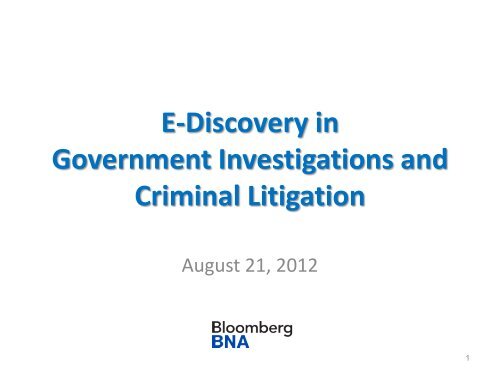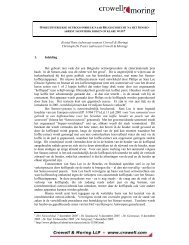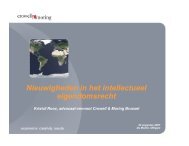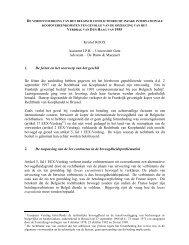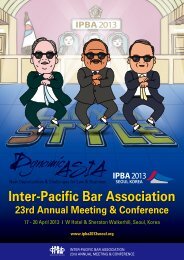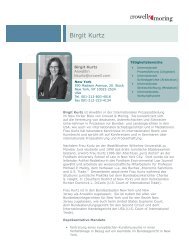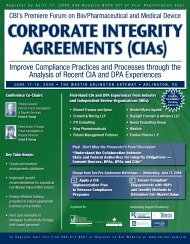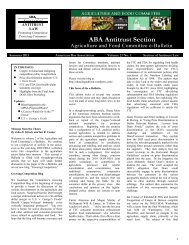ESI in Criminal Actions Meets the Fourth, Fifth - Crowell & Moring
ESI in Criminal Actions Meets the Fourth, Fifth - Crowell & Moring
ESI in Criminal Actions Meets the Fourth, Fifth - Crowell & Moring
You also want an ePaper? Increase the reach of your titles
YUMPU automatically turns print PDFs into web optimized ePapers that Google loves.
E-Discovery <strong>in</strong><br />
Government Investigations and<br />
Crim<strong>in</strong>al Litigation<br />
August 21, 2012<br />
1
Panelists<br />
• Ron Hedges: Moderator<br />
• Judge Thomas Vanaskie<br />
• Andrew Goldsmith<br />
• Douglass Mitchell<br />
• Just<strong>in</strong> Murphy<br />
• Sean Broderick<br />
2
Materials Available for Download:<br />
• Bloomberg BNA Digital Discovery & e-Evidence article: “Jo<strong>in</strong>t Federal Crim<strong>in</strong>al E-Discovery Protocol Places<br />
Cooperation Above Motion Fil<strong>in</strong>gs”<br />
• JETWG paper: “Recommendations for Electronically Stored Information (<strong>ESI</strong>) Discovery Production <strong>in</strong><br />
Federal Crim<strong>in</strong>al Cases”<br />
• Forms of production chart<br />
• Georgetown Law Journal article: “In <strong>the</strong> Digital Age, Ensur<strong>in</strong>g That <strong>the</strong> Department Does Justice”<br />
• Text of In re Boucher<br />
• Text of United States v. Meregildo<br />
• Text of United States v. Sk<strong>in</strong>ner<br />
• Article address<strong>in</strong>g JETWG protocol<br />
• Article regard<strong>in</strong>g New Jersey crim<strong>in</strong>al rule<br />
• Article regard<strong>in</strong>g proposed federal legislation<br />
3
Key Topics for Discussion<br />
• <strong>ESI</strong> and Subpoenas<br />
• <strong>ESI</strong> and The <strong>Fourth</strong> Amendment<br />
• Post-Indictment Discovery of <strong>ESI</strong><br />
• Use of Social Media<br />
4
Subpoenas<br />
• The duty to preserve can come before <strong>the</strong> subpoena<br />
– 18 U.S.C. § 1519 (“<strong>in</strong> contemplation of”)<br />
– Government has a duty to preserve all material exculpatory<br />
evidence. U.S. v. Branch, 537 F.3d 582 (6th Cir. 2008);<br />
– U.S. v. Suarez, 2010 WL 4226524 (D.N.J. Oct. 19, 2010) (adverse<br />
<strong>in</strong>ference sanction for deletion of text messages between FBI<br />
agents and cooperat<strong>in</strong>g witness).<br />
• Direct and collateral consequences for fail<strong>in</strong>g to preserve<br />
• Spoliation may be potential crime <strong>in</strong> and of itself and be<br />
used to prove consciousness of guilt for underly<strong>in</strong>g crimes.<br />
• Discussions with government – identify and avoid<br />
problems.<br />
5
<strong>Fourth</strong> Amendment<br />
• Search Warrants<br />
• GPS Monitor<strong>in</strong>g<br />
• Cell Phone Search<br />
and Seizure<br />
6
Digital Evidence Search Warrants<br />
• Collision between <strong>Fourth</strong> Amendment’s<br />
particularity requirement, pla<strong>in</strong> view doctr<strong>in</strong>e,<br />
and search and seizure of digital evidence<br />
where every file could potentially conta<strong>in</strong><br />
evidence identified <strong>in</strong> warrant<br />
• Over seizure creates risk of general warrant<br />
7
U.S. v. Comprehensive Drug Test<strong>in</strong>g<br />
• Where officers come across relevant documents<br />
so <strong>in</strong>term<strong>in</strong>gled with irrelevant documents that<br />
<strong>the</strong>y cannot feasibly be sorted at <strong>the</strong> site, large<br />
scale removal can be justified<br />
• A Magistrate Judge should <strong>the</strong>n approve <strong>the</strong><br />
conditions and limitations on a fur<strong>the</strong>r search<br />
through those documents; “<strong>the</strong> essential<br />
safeguard required is that wholesale removal<br />
must be monitored by <strong>the</strong> judgment of a neutral,<br />
detached magistrate”<br />
8
Digital Evidence Search Warrants –<br />
• Pla<strong>in</strong> view doctr<strong>in</strong>e<br />
should not be<br />
jettisoned <strong>in</strong> digital<br />
evidence cases –<br />
<strong>in</strong>stead, conf<strong>in</strong>es will<br />
vary from case to case<br />
<strong>in</strong> common sense, fact<br />
<strong>in</strong>tensive manner<br />
O<strong>the</strong>r Circuits<br />
9
U.S. v. Williams – O<strong>the</strong>r End of<br />
Spectrum<br />
• Warrant impliedly authorized officers to open<br />
each and every file on computer to view its<br />
contents, at least on cursory basis<br />
• If you have to<br />
click around,<br />
is it really <strong>in</strong><br />
pla<strong>in</strong> view?<br />
10
Search Warrant Delays<br />
• How long can <strong>the</strong> government wait to search <strong>the</strong><br />
seized <strong>ESI</strong>?<br />
• U.S. v. Metter, No. 10-CR-600 (DLI), 2012 WL<br />
1744251 (E.D.N.Y. May 17, 2012), while a delay of<br />
several months could be reasonable, a 15 month<br />
delay determ<strong>in</strong>ed to be unreasonable<br />
– (“government's retention of all imaged electronic<br />
documents, <strong>in</strong>clud<strong>in</strong>g personal emails, without any<br />
review whatsoever to determ<strong>in</strong>e not only <strong>the</strong>ir<br />
relevance to this case, but also to determ<strong>in</strong>e whe<strong>the</strong>r<br />
any recognized legal privileges attached to <strong>the</strong>m, is<br />
unreasonable and disturb<strong>in</strong>g.”).<br />
11
U.S v. Jones – “Unanimous” Decision<br />
• 9-0 decision that<br />
<strong>the</strong> actions of <strong>the</strong><br />
government were<br />
a search. But<br />
that’s all that was<br />
unanimous…<br />
12
Warrantless Searches of Cell Phones<br />
• Raises special concerns outside of traditional<br />
search <strong>in</strong>cident to arrest<br />
• No longer small conta<strong>in</strong>ers <strong>in</strong> pockets; libraries<br />
of <strong>in</strong>formation<br />
• Particular evidence that it was related to<br />
commission of crime … or just because it was<br />
<strong>in</strong> someone’s pocket …<br />
13
Cell Phone Search and Seizure<br />
• Cigarette pack or gateway device?<br />
– People v. Diaz; 4th Amendment does not require law<br />
enforcement to get warrant before search text messages<br />
stored on cell phone <strong>in</strong> possession of arrestee.<br />
– U.S. v. Hill; Cell phone found <strong>in</strong> a defendant’s cloth<strong>in</strong>g is an<br />
element of <strong>the</strong> person’s cloth<strong>in</strong>g, and should not be<br />
treated differently from a wallet<br />
– Schlossberg v. Solesbee; Warrantless searches <strong>in</strong>cident to<br />
arrest not reasonable absent show<strong>in</strong>g search was<br />
necessary to prevent destruction of evidence, to ensure<br />
safety, or exigent circumstances.<br />
– US v. Flores-Lopez; “A modern cell phone is a computer.”<br />
14
<strong>Fifth</strong> Amendment – Compelled Access<br />
to Encrypted Computer Information?<br />
• U.S. v. Doe, 11th Circuit<br />
– Provid<strong>in</strong>g encryption <strong>in</strong>formation testimonial?<br />
– Suspect could not be required to decrypt<br />
computer hard drives<br />
15
JETWG Recommendations for <strong>ESI</strong><br />
Discovery <strong>in</strong> Federal Crim<strong>in</strong>al Cases<br />
• Collaborative agreement between DOJ, FPD,<br />
and CJA provid<strong>in</strong>g recommendations for <strong>ESI</strong> <strong>in</strong><br />
federal crim<strong>in</strong>al cases<br />
• Promotes consistency, predictability, and<br />
dialogue<br />
• Meet and confer<br />
• Production<br />
• Brady implications<br />
16
Post-Indictment Discovery – Brady<br />
• U.S. v. Skill<strong>in</strong>g, 554 F.3d 529 (5th Cir. 2009)<br />
– No Brady violation for “open file” production of massive volume<br />
of <strong>ESI</strong>.<br />
– Gov’t provided searchable electronic “open file”, a set of “hot<br />
documents” and <strong>in</strong>dices to “hot documents.” No evidence of<br />
bad faith or that Government padded “open file” with<br />
superfluous <strong>in</strong>formation.<br />
• U.S. v. Salyer, 2010 WL 3036444 (E.D. Cal. 2010)<br />
– Gov’t ordered to search for and identify Brady/Giglio material.<br />
– Gov’t should have been identify<strong>in</strong>g such material dur<strong>in</strong>g 5-year<br />
<strong>in</strong>vestigation.<br />
– If this was impossible for <strong>the</strong> Gov’t it is even more impossible<br />
for <strong>the</strong> defense to do so <strong>in</strong> matter of months.<br />
17
Post-Indictment Discovery – Brady<br />
• U.S. v. Warshak, 631 F.3d 266 (6th 2010)<br />
– Rule 16 conta<strong>in</strong>s no <strong>in</strong>dication that documents must be<br />
organized or <strong>in</strong>dexed.<br />
– Defendant’s own documents at stake; had access to those<br />
documents for 2.5 years; <strong>in</strong>ventory provided; <strong>ESI</strong> was reasonably<br />
searchable.<br />
• U.S. v. Farkas, No. 11-4714 (4th Cir., May 16, 2012)<br />
– No abuse of discretion when court refused to grant defendant<br />
more time to review 59 million pages for exculpatory evidence.<br />
18
Social Media<br />
• Unique preservation, collection and discovery<br />
challenges<br />
• Government’s statutory authority to access<br />
social media/<strong>ESI</strong> v. defendant’s lack of<br />
authority<br />
• Ethical limits on <strong>the</strong> ga<strong>the</strong>r<strong>in</strong>g and use of<br />
social media<br />
– Use of social media and <strong>in</strong>ternet for fact ga<strong>the</strong>r<strong>in</strong>g<br />
– Use of electronic media to discuss a case<br />
19
Social Media (cont.)<br />
• Social media at trial<br />
– Jury venire research<br />
– Ethical limitations<br />
– New trial ordered for failure to disclose Skype<br />
communications. U.S. v. Stirl<strong>in</strong>g, No. 11-20792<br />
(S.D. Fla. June 6, 2012)<br />
– Juror use of social media. Erickson Dimas-<br />
Mart<strong>in</strong>ez v. State of Arkansas, 2011 Ark. 515<br />
(2011) (juror tweets overturned conviction)<br />
– Au<strong>the</strong>nticat<strong>in</strong>g social media evidence<br />
20
Questions?<br />
21
Thank you for attend<strong>in</strong>g.<br />
• Ron Hedges: Moderator r_hedges@live.com<br />
• Judge Thomas Vanaskie<br />
• Andrew Goldsmith Andrew.Goldsmith@usdoj.gov<br />
• Douglass Mitchell dmitchell@BSFLLP.com<br />
• Just<strong>in</strong> Murphy just<strong>in</strong>.murphy@crowell.com<br />
• Sean Broderick sean_broderick@fd.org<br />
22


